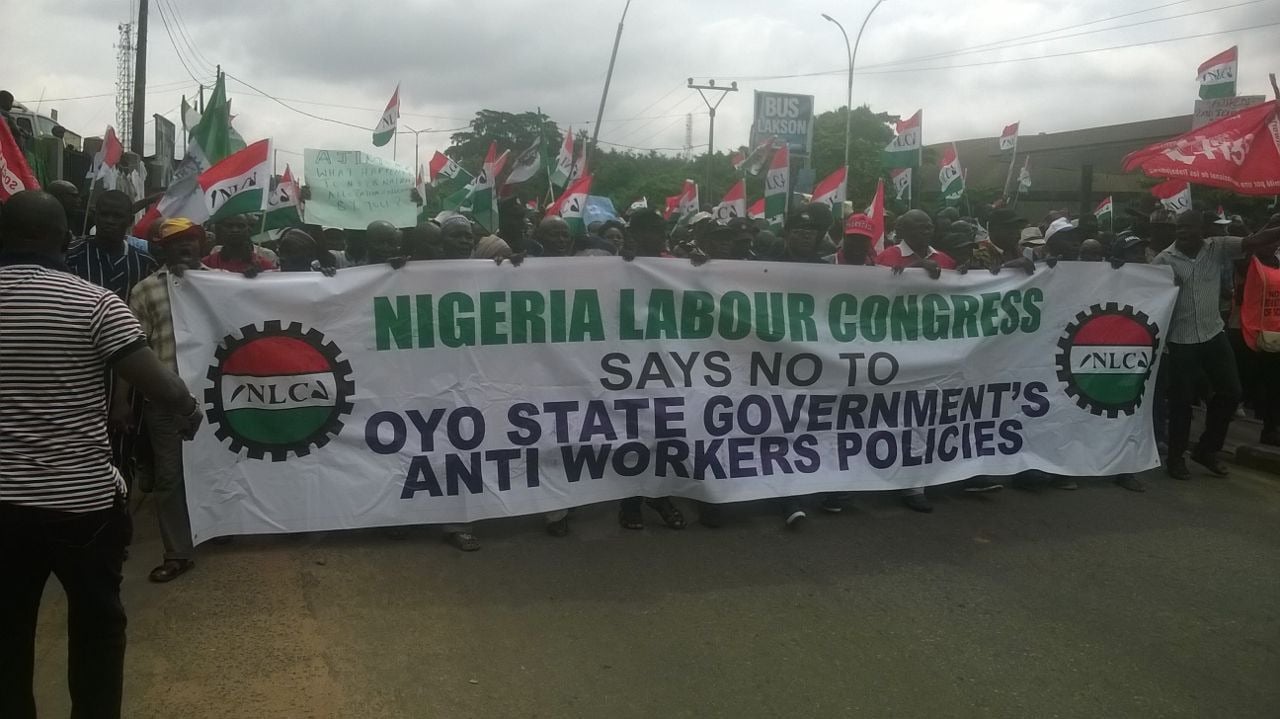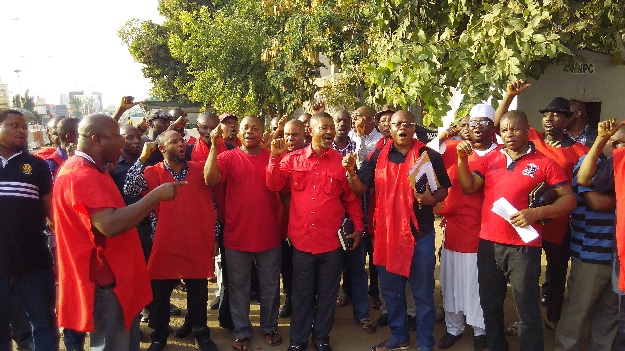Socio-Economic Rights and Accountability Project (SERAP) has requested Fatou Bensouda, prosecutor at the International Criminal Court (ICC), to “bring to justice” those responsible for inhumane acts against Nigerian workers, including state governors owing their workers months of salaries.
It specifically urged Bensouda to “you use your good offices and position to investigate allegations of collective punishment and crimes against humanity against tens of thousands of Nigerian workers as a result of non-payment of their salaries for several months”.
SERAP’s suit comes one day after Rauf Aregbesola, governor of Osun, the most financially unhealthy state in the country, said, in reference to the hardship occasioned by the state’s indebtedness to workers: “We want to tell our people that if we can endure the 30 days Ramadan hunger, we can endure anything.”
But SERAP, which views this “endurance” as “crimes against humanity”, told the ICC to “urgently commence an investigation proprio motu on the allegations committed against tens of thousands of Nigerian workers as a result of non-payment of their salaries, with a view to determining whether this amounts to ‘other inhumane acts’ within the court’s jurisdiction”.
Advertisement
“We are seriously concerned that non-payment of workers’ salaries by several state governments in Nigeria has made life impossible to live for the workers and families,” read the petition, dated July 7, 2016, and signed by Adetokunbo Mumuni, the organisations’ executive director.
“We also urge you to bring to justice anyone who is responsible for the inhumane acts committed against Nigerian workers and prohibited under the Rome Statute of the International Criminal Court to which Nigeria is a state party.
The petition reads in part: “SERAP contends that severe deprivation and mental or physical health challenges faced by Nigerian workers as a result of the non-payment of their salaries fulfil the requirements of this provision. This means that individual liability may attach to governors who continue to hide under the excuse of ‘limited allocations from Abuja’ to deny these workers the fruit of their labour.”
Advertisement
“The state governors ought to know that their actions and/or omissions would likely to cause serious physical or mental suffering or a serious attack upon the human dignity of workers whose salaries are not paid.
“Non-payment of salaries for several months have reduced Nigerian workers to ‘bare life’, or life not worth living, thus taking away their human dignity. The inhumanity of the non-payment of workers’ salaries is illustrated by the serious threats this poses to the workers’ physical and mental health, and family life as well as their ability to contribute to the development of the country. The non-payment of salaries has created an environment of powerlessness for several workers and perpetuated a system of impunity in many states.
“Article 7(1)(k) of the Rome Statute of the International Criminal Court criminalises other inhumane acts intentionally causing great suffering, or serious injury to body or to mental or physical health. The treatment of many workers in several states reaches the level of ‘inhumane acts’ covered under this provision.
“Serious and systematic levels of inhuman and degrading treatment have expressly been recognised as qualifying as other ‘inhumane acts’. The same applies to the deprivation of adequate standard of living of thousands of workers such as adequate food, shelter, and medical care as a result of the non-payment of their salaries.
Advertisement
“In the present case, the inhumane acts include non-payment of salaries of workers; failure of governors to use their executive authority to ensure a viable and corruption-free state, failure to provide the necessary administrative, financial and political conditions to facilitate prompt and timely payment of workers’ salaries.
“To the extent that these acts expose tens of thousands of workers to inhumane acts while denying them the ability to challenge the legality of the action by the state governments, the acts can only be seen as a course of conduct involving the commission of inhumane acts.
“SERAP believes that the non-payment of salaries of workers amounts to a serious attack on human dignity covered in the definition of ‘other inhumane acts’ under the Rome Statute, and fit within the ICC’s mandate. The gravity of non-payment of workers’ salaries for several months should not be dismissed a priori as lesser than that of the radically egregious acts the ICC has so far prosecuted.
“SERAP argues that to deprive workers of their salaries is to deprive them of their livelihoods and basic necessities to the right to life and human dignity, and to and cause them suffering of sufficient gravity and severity comparable to enumerated acts of crimes against humanity under article 7 of the Rome Statute. Because no person can live without the means of living, the non-payment of workers’ salaries has affected individuals’ well-being and prevented them from enjoying basic necessities of life and caused great suffering to them and their family members.
Advertisement
“International human rights law requires states to protect the rights of workers including to timely payment of salaries. The ICC can and should exercise its mandates under the Rome Statute to enforce these internationally recognized human rights by holding individual governors accountable for the crimes against humanity committed against many Nigerian workers.
“Nigerian workers have for many years been victims of particularly heinous violations of international human rights law caused by massive looting of public treasury and mismanagement by high-ranking public officials.
Advertisement
“SERAP is seriously concerned that several state governments in Nigeria are failing and/or refusing to pay workers’ salaries, amounting to billions of naira in arrears. The state governments that have failed and/or refused to pay workers’ salaries include: Bayelsa, Benue, Bauchi, Osun, Rivers, Oyo, Ekiti, Kwara, Kogi, Ondo, and Plateau states.
“SERAP also contends that the gross violations of human rights and deplorable standard of living of many workers and their families in several states of Nigeria are grave and therefore suggest reasonable grounds justifying a preliminary investigation by the ICC Prosecutor.
Advertisement
“Alongside investigating mass atrocity, the prosecutor should seek to investigate those crimes such as gross, systematic and widespread violations of workers’ right to timely payment of salaries that fall under the Rome Statute provision on “other inhumane acts” but remain unacknowledged as grave violations of human rights.
“Investigating violations of workers’ right to timely payment of salaries will allow the ICC to realise a broad notion of complementarity, as it will enable the Prosecutor to provide justice to the workers that many of the states in Nigeria are unwilling or unable to protect.”
Advertisement
SERAP therefore asked Mrs Bensouda to:
“Urgently commence an investigation proprio motu on the allegations of of crimes against humanity committed against tens of thousands of Nigerian workers as a result of non-payment of their salaries, with a view to determining whether this amounts to ‘other inhumane acts’ within the Court’s jurisdiction.
“In this respect, we also urge you to invite representatives of the state governments to provide written or oral testimony at the seat of the Court, so that the Prosecutor is able to conclude on the basis of available information whether there is a reasonable basis for an investigation, and to submit a request to the Pre-Trial Chamber for authorization of an investigation.
“Bring to justice those suspected to be responsible for inhumane acts against Nigerian workers.
“Urge the Nigerian government to fulfil its obligations under the Rome Statute to cooperate with the ICC; including complying with your requests to arrest and surrender suspected perpetrators of inhumane acts against Nigerian workers, take testimony, and provide other support to the ICC.”
2 comments







Step in the right direction
Excellent! Had earlier thought that SERAP had been compromised! Even today Pensioners in Osun State were shown on Channels TV agitating for their 8 months arrears of pensions. Many of this governors keeps using economic downturn as an excuse, but their life style does not justify their claims. One of them clownishly claimed to have embarked on an empathic strike with his starving workers whilst he had billions in his accounts. And he claims to be a Christian? Is that the love that Christ advocated?It is nauseating the way he keeps calling the name of The Lord in vain! But he is not even half as evil as his beastly neighbor who started the fad. But they will discover sooner than they expect that though the mill of The Lord may grind slowly, it does grind exceedingly fine. May The Lord spare our life’s to see the ends of these children of Belial! Meanwhile, thumbs up for SERAP, more grease to your elbow!